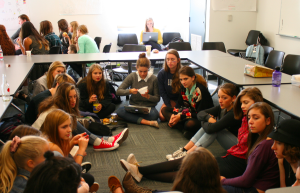Growth in gender affinity groups points to need for more talk on sexism, Urban School students say
With approximately 140 members combined, Students for Women’s Equality and Rights (SWEAR) and Young Men’s Group (YMG) are a strong presence at Urban this year.
Students signed up to join the SWEAR and YMG online conferences at a rapid rate in September, according to student leaders for both groups.
“SWEAR has made me feel a more socially aware and stronger person,” said Mabel Taylor (’14), who is SWEAR co-leader.

One reason for the growth of these gender-affinity groups may be that despite Urban’s ultraliberal environment, sexism is far from extinguished.
“Urban doesn’t satisfy my needs or the needs that I notice are present at SWEAR on things like the dress code,” said Taylor. She clarified her statement by acknowledging that gender inequality is a hard issue to address.
“No matter how politically correct or how in touch a community is, it is inevitable that (it) is going to mirror larger patterns of patriarchal structures,” Taylor said.
Taylor is not the only student who has noticed unintentional sexism at Urban.
“In my calculus class, the large majority of people are boys and my teacher made a group for just girls … I almost feel like I have to prove my intelligence sitting at that table,” said SWEAR co-leader Sophie Kovel.
While for most of our history and in most of the world sexism has predominantly disadvantaged women, some Urban students see sexism against men, too.
Nicholas Fong (’14) said that in his experience, at Urban “teachers were more caring and put more emphasis on girls than guys.”
“It was a little disheartening,” he added.
Fong is far from alone in his acknowledgment of sexism toward men at Urban. As Noah Melrod (’15) pointed out, Urban’s Multicultural Club, which includes many different affinity groups, “does not have YMG in it.”
On the other hand, some feel that concerns over reverse sexism are unwarranted. “A lot of people talk about like reverse sexism at Urban because there are more girls in leadership positions,” said Taylor. “And I think that is pretty stupid because I don’t think that is giving a strong enough attention to the fact that for a long time and for most places men are the majority.”
It seems that as students become more aware of gender inequalities at school they seek safe places like SWEAR and YMG to discuss them.
While they definitely have a strong influence independently, many believe that to have more of an impact, YMG and SWEAR, which both meet at lunch on Tuesdays, have to address issues together.
“More intersection between (YMG and SWEAR) could better address (gender) issues,” said Melrod.











